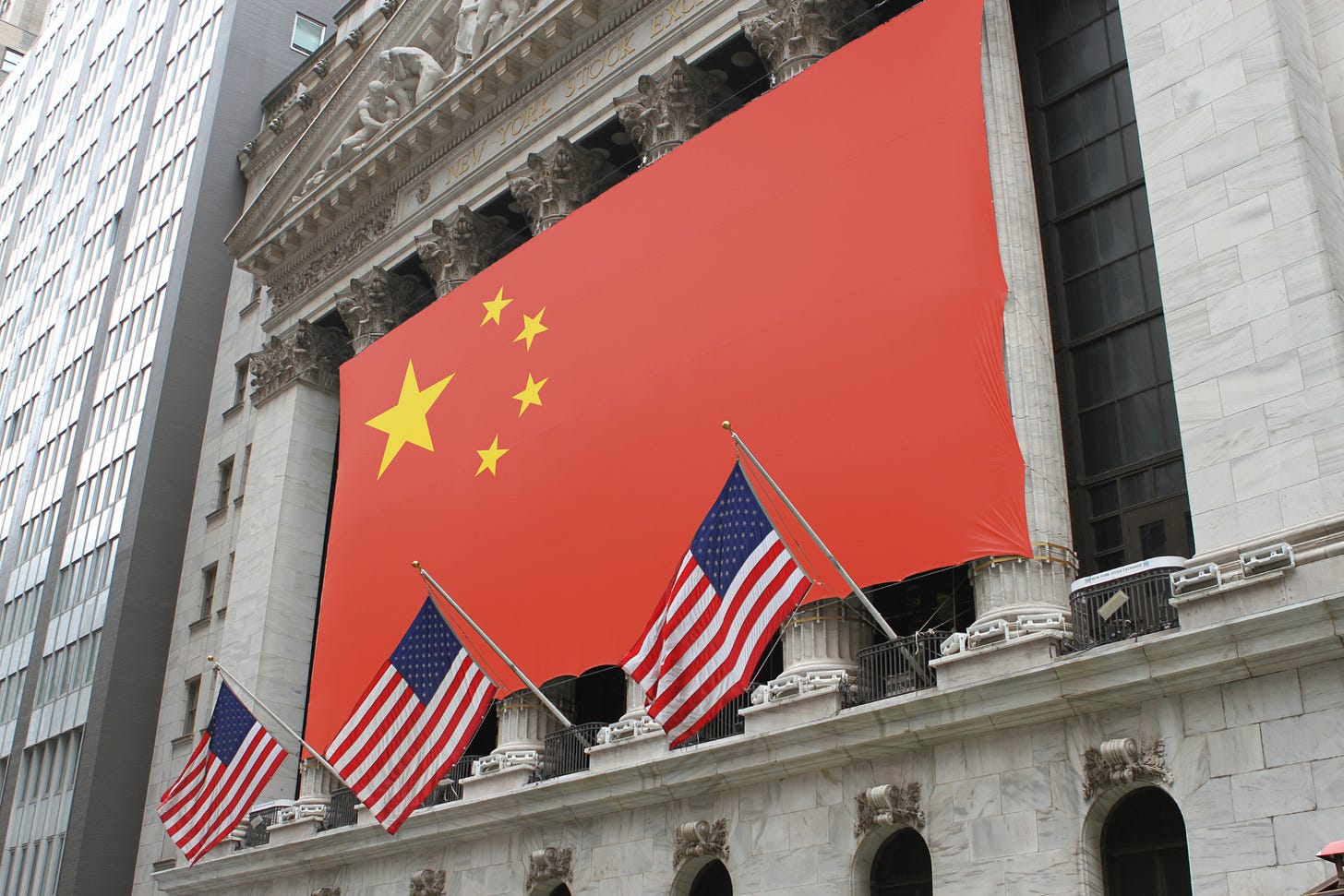Thanks in part to the Trumpian uprising and in part to Covid, “decoupling from China” has emerged as a point of bipartisan consensus. Team Biden retained and expanded Donald Trump’s tariffs on Chinese goods, and sought to retard the Middle Kingdom’s drive toward the most advanced semiconductors. And in the 2024 race, both campaigns talk tough on China, though Trump must be credited with the bolder approach: an across-the-board tariff on foreign goods.
But whether mounted by a President Harris or Trump, these efforts will come to naught if one crucial domestic actor has its way: namely, Wall Street.
As a new report from the Coalition for a Prosperous America, which represents America’s domestic manufacturers, details, “large Wall Street firms, like BlackRock and Goldman Sachs, have launched joint ventures with banks controlled by the [Chinese Communist Party] in exchange for direct access to China’s multitrillion-dollar wealth-management market.” The deal amounts to a “Wall Street-China merger,” whereby some of the most powerful institutions in US and global capital markets come under the regulatory control of Beijing, even as these firms inject capital into a Chinese economy otherwise starved of foreign direct investment.
As the CPA report warns:
With foreign investors increasingly turning their backs on the PRC, and domestic institutions avoiding mainland-listed stocks, Beijing needs the savings of middle-class investors to restore liquidity to China’s equity markets. The [Wall Street-Chinese joint ventures] are expected to deliver ‘patient capital’ to Beijing by selling illiquid investments, such as personal pensions, that are less susceptible to the panic selling of China’s stock exchanges. This mass transfer of capital—and the fees it generates for the joint ventures—promises even stronger and more troubling ties between Beijing and Wall Steet’s management class.
The Wall Street firms will naturally benefit handsomely from their typically hefty fee structures. Meanwhile, the fresh capital will grease the wheels of China’s Belt and Road Initiative and other geopolitical strategies that are contrary to vital US national and security interests. Worst of all, the China-Wall Street merger creates a powerful lobby for Beijing just when the US political class, in a fairly bipartisan way, is getting serious about protecting and reviving American manufacturing.
Long before the Wall Street-China merger, the US financial industry took Beijing’s line on issues like tariffs and export controls. “We need your help,” pleaded then-Chinese Vice Primer Liu He during a 2018 gathering with Wall Street honchos, including Jamie Dimon, Larry Fink, and David Solomon, as Beijing faced off against the Trump administration in trade talks.
So reported The Wall Street Journal in 2020. The paper noted that the Chinese delegation enticed the Wall Street bosses by offering “US financial firms a new opportunity to expand in China.” And sure enough, “the get-together helped turn Wall Street into one of the biggest cheerleaders for a deal. In the trade agreement that was eventually signed in January, China’s financial opening stood out as a prominent concession.”
The new Wall Street-China merger will solidify this relationship even further, helping advance what the CPA report describes as “an elite-capture strategy, whereby Beijing hijacks the political influence of Wall Street to have its way with legislators and regulators in Washington.”
One Thing I Watched
Alien: Romulus. I normally despise Hollywood franchise films, but this one is thrilling, a throwback to the claustrophobic spirit of the 1979 Ridley Scott original that takes some of its most potent elements and themes, such as the role of the androids, to poignant new heights.





The CCP owns the DNC. Baizuo Tim Walz has deep, dark connections with China and has visited 30 times. ESG helps the CCP by deindustrialzing America and the West: https://yuribezmenov.substack.com/p/tim-walz-baizuo-court-eunuch-useful-idiot
This may be a dangerous situation for the Chinese. I worry that the Chinese people, and the nation as a whole, could be thrown off course. It seems the national center, with Wall Street cheering it on (and perhaps even assisting somehow?), is attempting to radically change their system, including their banking and finance sectors, for example, the 3rd Plennum results want to eliminate their partial capital market fragmentations just we did in the latter 1970s. The changes they are pursuing, and the arguments supporting them, are just like the ones the USA did between the mid 1970s and mid 1980s. Those changes failed, even with the support of an extractive global empire that allowed for perpetual large government deficits, trade deficits, and high liquidity without inflation, which are conditions China won’t have. In the case of the USA, even in their own oversimplified terms (like real GDP growth rates), these justifications failed within a short time after the changes were implemented. Perhaps it will turn out differently in China, if these reforms do happen. I hope so, for the sake of the Chinese people.